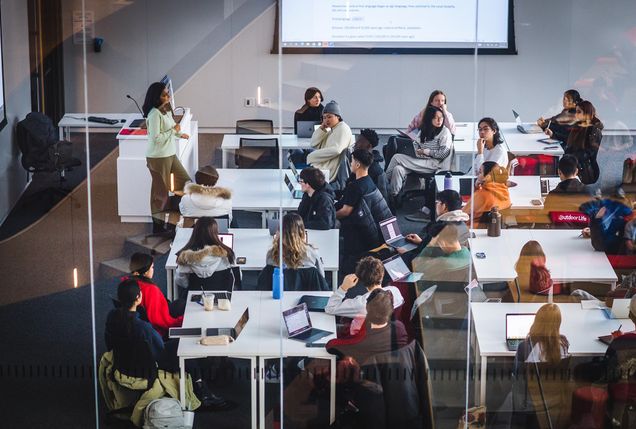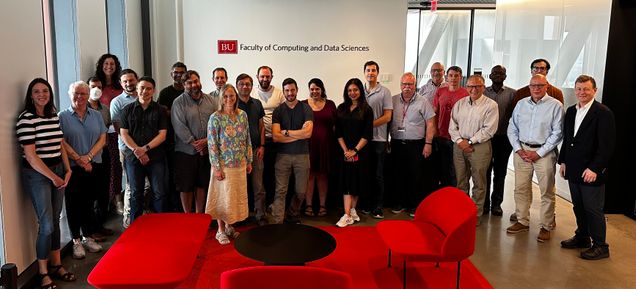About CDS
Data is transforming society. It is bridging intellectual boundaries and shaping decisions and thought leadership in every field. From public policy and criminal justice to medical research and machine learning, data is essential, and it is increasingly influencing government, industry, and our personal and professional lives.
Founded in 2019, the Faculty of Computing & Data Sciences is a university-wide, degree-granting academic unit focused on core and applied areas of computing, computational, and data-driven inquiry. Housed in the top five floors of an iconic 19-story building, Duan Family Center for Computing & Data Sciences, with its convention-bending design, CDS complements traditional cognate academic disciplines by laying the foundation for innovation-driven, civic-minded computing to maximize the real-world impact of research, curricular, and co-curricular programs that are thematically aligned with strategic goals of the university.
Drawn from traditionally relevant disciplines such as computer science and statistics, as well as diverse others including law, business, and health sciences, this unique academic unit welcomes the challenges of the 21st century with a dual focus on education and research.
Education
Through pathbreaking joint degrees, co-curricular, and research programs, Computing & Data Sciences gives learners the knowledge and tools to leverage data to take on complex problems.

The Center—the largest carbon-free building in Boston—is home to the Computer Science and Mathematics & Statistics departments, as well as the Hariri Institute for Computing, BU Spark!, and state-of-the-art labs, collaborative research spaces, and classrooms.
The future will be defined by data and shaped by how computers gather, manipulate, interpret, and use that data for evidence-based decision making BU is at the forefront of this seismic shift, and donor support can accelerate and expand activities in research, teaching, and learning.
CDS welcomes students of all disciplines to combine data science with other majors and minors to foster the skills necessary in a data-driven world.
They are taught by faculty with an extraordinary range of expertise and interests, with specialists in areas including computational biology and bioinformatics; human-centered computing; game theory and policy; cryptography and law; and big data algorithmics.
Research

The 50+ members of the CDS Faculty come from varied disciplines and 11 BU schools and colleges, but they share a goal: to leverage the power of computation and data-led inquiry to analyze complex problems and generate real-world solutions. In collaboration with experts from academia, industry, media, government, and nonprofits, they use data science scholarship to address the societal challenges of our time, from equity to sustainability, to public health, to cybersecurity, to privacy.
CDS Assistant Professor Brian Cleary, for example, has blended biomedical engineering and computational biology to study how viral load and epidemic dynamics can be used to optimize pooled testing in resource-constrained settings. And CDS Assistant Professor Kira Goldner deploys game theory and policy to enhance her research on how “imperfect competition” can reduce inefficiency in carbon auctions.
There are two main long-term research focus areas: AI for science and civic data science. Within these areas, called “Impact Hubs,” are labs—traditional research groups let by faculty—and co-Labs, collaborations with internal or external departments, centers, or labs. Examples of the latter include the Justice Media co-Lab with BU’s College of Communication and the Responsible Use of Data co-Lab with MassMutual. To ensure that the education and research programs in CDS are motivated by and address real-world challenges, we also have an Experts-in-Residence (EIR) Program hat welcomes experts in specific fields—both on the technology side and on the application side—to spend time in CDS to lead activities including lectures or workshops, co-teach practicum courses or research seminars, join existing research groups, supervise student interns and fellows, or collaborate with PhD students.
Learn more about research at CDS.